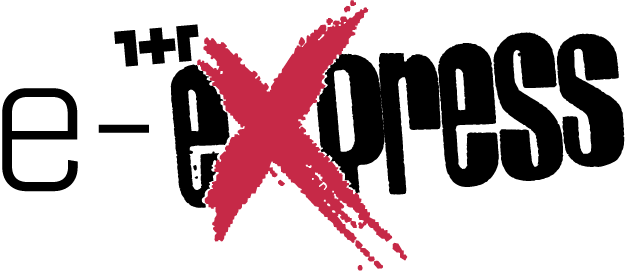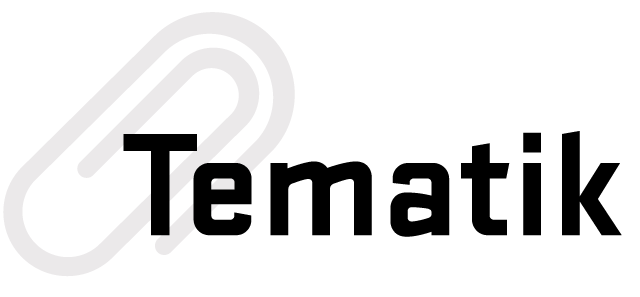Just as in the famous poem of Bertolt Brecht, A Worker Reads History… A young man goes to Hopa, a town on the Black Sea coast, to study at the university, and finds himself engaged fully in the production of The Hopa Tea Cooperation. Serdar Doğan tells his story as well as that of the cooperative and the agricultural production in the region.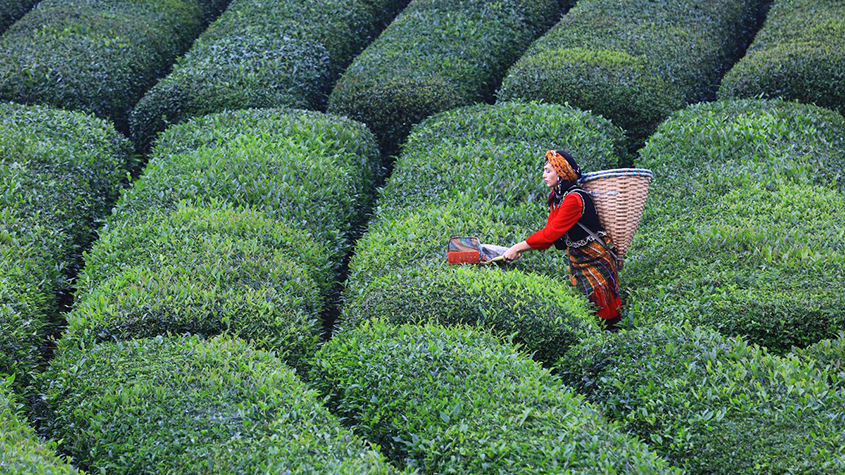
What is your background and how did you start working for the Hopa Tea Cooperative?
Serdar Doğan: I’m twenty-three years old. I’m from Sivas [a town in central Antolia]. I first came to Hopa to study at the university. I’m studying economy. It’s been three years since I joined The Hopa Tea Cooperative. They needed workers, so one day I knocked on their door. They asked if I could light the boiler and work with the ovens and I did. In a year I learned to check and fix all the machines. Then I moved to the office. I work in the factory during the tea seasons and in the office afterwards. I can’t define clearly what my job is. It’s the same for all my colleagues.
What do you do in the office?
Selling, shipping and packaging tea, also the follow-ups of the shipments. I’m also doing pre-accounting work.
Why were you interested in the cooperative?
The cooperative wasn’t set up in a day. There were long debates going on in the villages and the neighbourhoods about why it was needed it and how could it restart producing. I was convinced that a cooperative was really needed in the region. I realized how important tea production was for the community here and I saw that they weren’t getting their due for all their hard work.
The cooperative is completely independent from both the public and the private sector. It stands against any policy that puts the producers in a difficult position by imposing quotas or contingent rates like the public company Çaykur does. It differs from the private sector because the cooperative offers a model created by the producers themselves.
Can you tell us about the agricultural production in the region?
Tea has been the only production here for a long time. Most of the people are dependent on it. Tea is harvested three times a year: in May, in July and in September. The real problem begins in the selling process. The main buyer is Çaykur. It’s a public company that has a tea factory in almost every little district of Eastern Black Sea region. But private sector is also very powerful and Çaykur paves the way for them to become even more powerful. For the last two years and for the first time private companies have bought more fresh tea than Çaykur. Çaykur applies quotas: “Even if you produce five tons, I’ll only buy three this season.” What are we to do with the two tons left? As we obviously wouldn’t throw it away we have to sell it to the private sector. The state determines a base price under which the private sector can’t propose any deal. But they do anyway. They buy for one and a half liras even if the fixed minimum tariff is two liras. And they always pay late. How can you expect farmers to get by under these circumstances? There’s a saying in Rize [a big town in west of Hopa, famous for its tea production]: “If you’re going out of business, take a truck and go to Hopa, in two years time you’ll be saved.” They come and buy our tea for one and a half liras and then sell it to the private sector. Next time they say “we’ll pay two liras”, but a year later they’re nowhere to be seen. That’s why people don’t trust the private sector. But because Çaykur’s policies never protect the producers, people have to sell to private companies that they consider as the lesser evil. And that’s where we see the necessity of the cooperation.
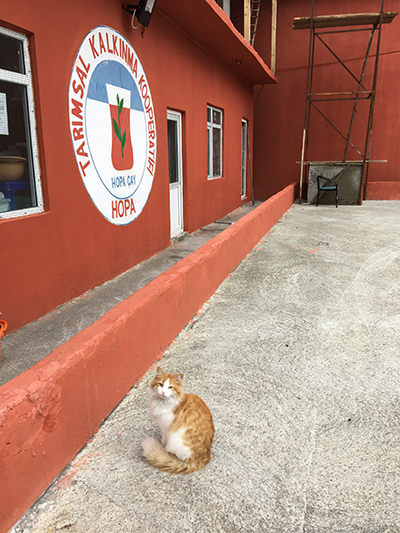 You said “There were long debates going on in the villages and the neighbourhoods”. What were the main issues and decisions?
You said “There were long debates going on in the villages and the neighbourhoods”. What were the main issues and decisions?
We came to the conclusion that the cooperative was a necessity and that we needed it to keep producing. There was a real lack of confidence in everyone. But we managed to overcome many difficulties and started producing. The previous board was hypocritical. That’s why the production had stopped in the first place. Then in 2012 the current board was elected. The first few years nothing could be done because of all the debts that the new board had to take over. The cooperative also owed money to the producers and that had created a problem of trust. There was no production at all. It was a very hard task to convince people to give their tea to a cooperative that already owed them money. To resolve this, we had to organize solidarity platforms. We sold solidarity cards all around Turkey, we talked to everyone about the cooperative and the tea we would produce. We showed everyone our determination. With all these efforts we raised some money, which allowed us to pay the tea we bought in advance. That helped us re-establish the confidence with the producers.
How did you organize the selling of the solidarity cards?
We arranged some meetings with Artvin Solidarity Association’s branches in Istanbul and in Ankara. But above all it was people in socialist-leftist organizations who encouraged us. Last year we sold solidarity cards in Ankara, İstanbul, İzmir and Bursa. It’s not a donation. It’s actually the way we’re able to sell the tea with an advanced payment.
Between Çaykur and the private sector where exactly does the cooperative stand?
The cooperative is completely independent from both the public and the private sector. It stands against any policy that puts the producers in a difficult position by imposing quotas or contingent rates like the public company Çaykur does. And it differs from the private sector because the cooperative offers a model created by the producers themselves. They can’t run away from their own producers who at the same time are their friends, their neighbours. They have to pay them. Plus, they don’t have a boss. All the members of the board are also producers.
We sold solidarity cards all around Turkey, we talked to everyone about the cooperative and the tea we would produce. With all these efforts we raised some money, which allowed us to pay the tea we bought in advance. That helped us re-establish the confidence with the producers.
Does the cooperative seek profit?
Producing tea has a cost. We add a small margin of profit to that. It’s a very small amount like one or two liras. That profit is used to pay the debts. A cooperative shouldn’t have a profit motive. It should protect the producers as well as the consumers. If you sell for twenty liras something that costs you ten liras to produce, that profit of ten liras is bound to seduce some people. At one point that becomes a real problem.
How are the working conditions?
Our current situation allows us to pay the minimum wage for eight hours of work. Depending on the seasons one shift can last up to nine or ten hours. In that case those who work overtime get paid more. We all have social security. We work six months a year in the factory. All the workers here know everything about the cooperative. We don’t have a union yet. We’re thinking about it. Of course, we don’t have employers here. So, if we have demands we have to address them to ourselves! The cooperative has two work places: the office-shop and the factory. Maybe those of us who work in the factory can join a union. A while ago a union called Tez-Koop-İş tried to get in touch with us. But they had a structure based on office and store workers and we rejected.
Are all workers involved in decision-making process?
Normally the general assembly choses an executive board which has weekly meetings. But we have an “executive assembly” where most decisions are made. Our objective is to constitute an assembly in which all eighteen villages are represented. We’d like to discuss subjects in the villages before a decision is taken. Participation in the assembly varies from time to time. As of now we have between twelve to and twenty participants, five of which are also board members. Every worker can join the assembly and participate in the decision-making process. Assembly meetings are open to everyone. The representatives inform all villagers about the meetings. For the most important decisions there are even official announcements in villages. All workers are welcome to attend to and express their views in those meetings. We go to villages talk to the muhtars [officially elected village administrator] and ask the representatives if there are people looking for work and thus a pool of workers is created. Cooperative assembly fixes main working conditions and seeks consensus. There are also regular meetings between the board and the workers and meetings between workers themselves.
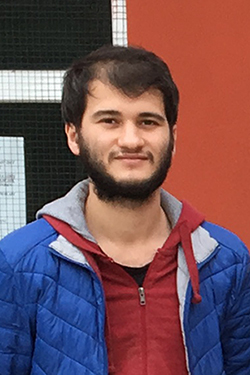
Do you have female workers?
Yes, we do and their number is increasing. At first there were two, now they are eight. The plucking of tea leaves is mostly done by women anyway. Since they’re the ones gathering it why couldn’t they produce it?
How would you summarize cooperative work?
It’s a mechanism that protects producers and consumers. It’s a structure that brings these two together without any intermediary.
Tea cultivation makes use of chemical fertilizers. How natural can the tea you produce be?
All around the world, in countries like Sri Lanka or India nearly forty different chemicals are used in tea plantations apart from the fertilizers. Climate and geographical conditions require this. In these regions they have a twelve-month harvest. In Turkey we don’t use these chemicals. But nevertheless, tea production isn’t completely natural either. In Turkey tea cultivation employs an artificial fertilizer that respects the Ministry of Agriculture’s criteria. The natural aspect of our tea comes from our treatment process. Our tea brews in fifteen minutes. Most teas you see on the market take no more than five minutes. If you look closely at these so-called brewed teas you’ll notice some kind of powder in it. That powder is food colouring. It is used to reduce the brewing time. We don’t use any additives. In some regions farmers are experimenting organic fertilizers. But it reduces the yields since the soil is so deeply damaged because of years of artificial fertilizer usage.
Producing tea has a cost. We add a small margin of profit to that. That profit is used to pay the debts. A cooperative shouldn’t have a profit motive. It should protect the producers as well as the consumers.
How would you describe The Hopa Tea Cooperative’s current situation?
Every year we say, “it can’t be worse than this”, but unfortunately it depends on a lot of factors that we can’t control. Our cooperative has around four thousand and five hundred partners. Last year we decided to ask a thousand of them to give us tea for every supply period. Five hundred tons by supply period means one thousand and five hundred tons overall. It’s a very considerable amount for the cooperative. People felt the need for a cooperative because of the state’s bad policies. And now, everyone has experienced the facts we were talking about for years.
How would you like to imagine the cooperative in five or ten years?
We have to consider this in a much larger scale, as The Hopa Agricultural Development Cooperative. The Hopa Tea Cooperative is functioning in this cooperative structure. It focuses on tea because that’s the sector in which the need was the most important. Apart from tea there are a lot of other products in the region, like fruits, that are under-cultivated. We should fix this. Maybe we could sell them as dried fruits. In five years, The Hopa Agricultural Development Cooperative could become a structure in which producers in every sector would be able to find solutions to the difficulties they face by themselves.
Translated by Alican Tayla

